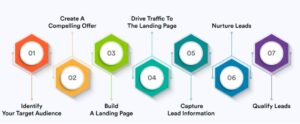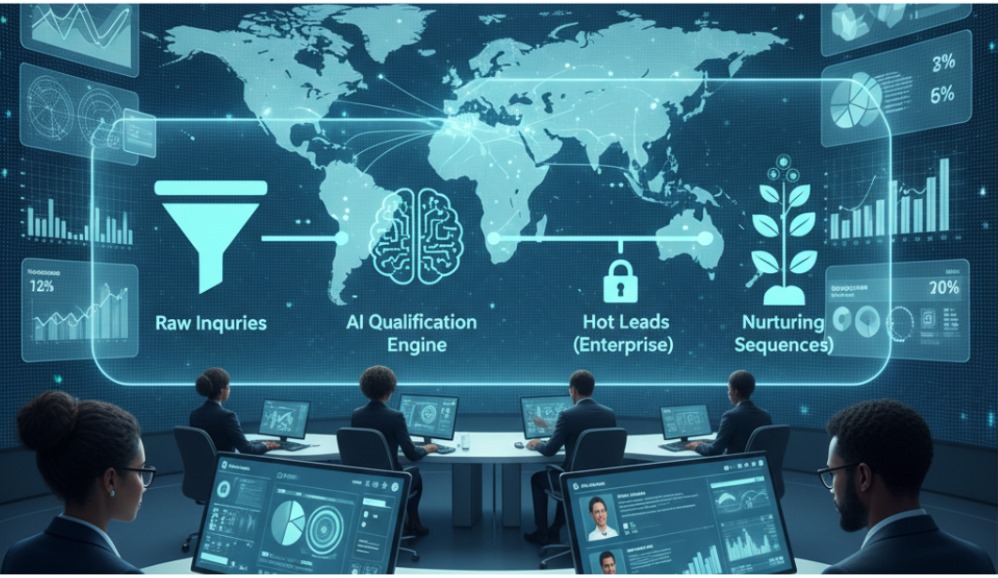Generating leads is one thing, but consistently landing high-value enterprise clients? That’s a whole different ballgame. It demands precision, deep insights, and a nurturing touch that traditional methods often can’t deliver at scale. But what if there was a way to make that process smarter, faster, and much more efficient?
Turns out, there is. AI isn’t just a buzzword; it’s a game-changer for businesses looking to streamline their enterprise lead pipeline, from initial qualification right through to a ready-to-convert prospect.
The AI Stack in Modern Lead Generation
Let’s be real, enterprise sales cycles are long and complex. They involve multiple stakeholders, intricate requirements, and a whole lot of nuanced communication. This isn’t about blasting out generic emails; it’s about surgical precision. And that’s exactly where the modern AI stack shines, transforming how a lead generation agency approaches this challenge.
Think of it as having an incredibly smart assistant who can sift through mountains of data, identify patterns, and even predict behaviors that would take human teams weeks to uncover. AI tools today aren’t just automating simple tasks; they’re providing strategic intelligence that directly impacts the bottom line. For instance, companies leveraging AI for lead generation have seen a 50% increase in leads and a 40-60% reduction in costs per lead (HubSpot) (Source).
What does this “AI stack” actually look like? It’s a combination of technologies working in harmony:
- Natural Language Processing (NLP): For analyzing unstructured data from emails, social media, and customer interactions to understand sentiment and intent.
- Machine Learning (ML) Algorithms: To predict which leads are most likely to convert based on historical data patterns.
- Predictive Analytics: To forecast market trends, identify emerging opportunities, and even pinpoint potential churn risks.
- Marketing Automation Platforms: Integrated with AI to personalize content delivery and engagement at scale.
These aren’t standalone tools; they’re integrated to create a cohesive system. Platforms like BrandBooster.ai, a data-driven lead generation agency, for example, help businesses automate lead pipelines and improve conversion quality using these AI insights. It’s about moving beyond simple automation to truly intelligent automation, allowing lead generation companies to focus on strategy rather than manual sifting.
Predictive Lead Scoring and CRM Sync

One of the biggest headaches in enterprise lead generation is figuring out which prospects are actually worth your sales team’s precious time. You don’t want them chasing cold leads, do you? That’s where predictive lead scoring steps in, acting like a highly sophisticated filter.
AI models analyze a vast array of data points – everything from a prospect’s website activity, content downloads, email engagement, job title, company size, industry, and even their social media presence. It then assigns a score, indicating how likely that lead is to convert. This isn’t just a simple “hot” or “cold” tag; it’s a nuanced, data-backed probability.
But the real magic happens when this predictive scoring is seamlessly integrated with your Customer Relationship Management (CRM) system. When a lead’s score updates in real-time within your CRM, your sales team gets an immediate, actionable signal. They know exactly who to prioritize and what specific pain points or interests to address based on the AI’s analysis. This level of insight transforms a generic sales approach into a highly targeted one.
For a top-tier lead generation service, this integration is non-negotiable. It ensures that no valuable lead slips through the cracks and that every interaction is tailored and timely. According to a recent report, companies using AI for lead scoring and CRM integration experience a 15% improvement in sales productivity (Marketing Dive) (Source).
Here’s what this synergy typically enables:
- Dynamic Prioritization: Sales teams always work on the highest-scoring, most qualified leads first.
- Personalized Nurturing: AI informs which content or outreach sequence is most appropriate for each lead based on their score and behavior.
- Faster Handoffs: Automated alerts ensure sales receives leads at their optimal engagement point.
- Improved Data Accuracy: AI can help cleanse and enrich CRM data, making all subsequent decisions more reliable.
This isn’t about replacing human intuition; it’s about augmenting it with data-driven intelligence, ensuring your sales pipeline is always filled with high-potential prospects.
Workflow Example: From Prospect to Demo
Let’s walk through a typical journey for an enterprise prospect, powered by an AI-driven lead generation strategy. It’s less like a traditional funnel and more like a personalized, adaptive pathway.
Imagine a potential client, “Acme Corp,” is researching solutions for optimizing their supply chain. They land on your company’s blog post about “AI in Logistics.” The AI-powered tracking system notes their visit, the time spent, and the specific content consumed. This initial interaction, even if anonymous, starts building a profile.
Next, Acme Corp downloads a whitepaper on “Enterprise Supply Chain Resilience.” Now, the system has an email address. The AI immediately begins to enrich this profile with publicly available data: company size, industry, revenue, key decision-makers on LinkedIn. Simultaneously, a personalized email nurturing sequence, designed by the AI based on their content consumption, is triggered. It offers more relevant resources, perhaps a case study featuring a similar company.
As Acme Corp engages with more content, attends a webinar, or interacts with a chatbot on your site, the AI continuously updates their lead score. If their score crosses a predefined threshold, they visit your pricing page or specifically ask about integration capabilities, the AI flags them as “sales-ready.” An automated alert is sent to the appropriate sales development representative (SDR) with a summary of Acme Corp’s engagement history and likely pain points. The SDR then reaches out with a highly relevant, personalized message, often leading to a successful demo booking. This proactive, data-informed approach ensures that even for complex enterprise solutions, the journey feels seamless and relevant to the prospect, moving beyond generic tactics to something truly effective for local lead generation and beyond.
Impact on Enterprise Sales Velocity
So, what does all this mean for the pace of enterprise sales? In a word: acceleration. When you’re dealing with high-value contracts, every day saved in the sales cycle can translate into significant revenue gains. AI isn’t just making things easier; it’s making them faster and more predictable.
By accurately qualifying leads upfront, sales teams aren’t wasting time on prospects who aren’t a good fit or aren’t ready to buy. This focus means they can dedicate their energy to nurturing truly promising opportunities, moving them through the pipeline with greater efficiency. The result? A noticeable uptick in sales velocity.
Think about it: less time spent on manual research, less guesswork in prioritization, and more informed conversations from the very first touchpoint. This translates directly into higher conversion rates and shorter sales cycles. In fact, companies that effectively use AI in their sales processes report an average of 10-15% reduction in sales cycle length (Statista) (Source).
Working with a specialized lead gen agency that harnesses these AI capabilities isn’t just about getting more leads; it’s about getting the *right* leads, at the *right* time, with the *right* information. It empowers your sales team to be more strategic, more impactful, and ultimately, more successful. The future of enterprise sales isn’t just digital; it’s intelligently automated, allowing businesses to scale their outreach and impact in ways previously unimaginable.


